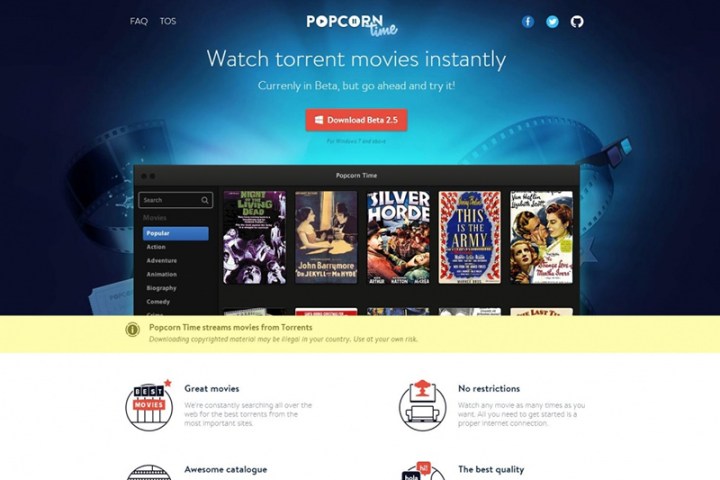
stealing watching first-run movies and TV shows for free, will soon become a bit harder to find if overseas justice systems have their way. Variety reports that a popular derivative of Popcorn Time, popcorntime.io, has been shut down in accordance with court decisions in New Zealand and Canada.
The development follows weeks of sporadic popcorntime.io uptime. Staff initially blamed the problem on infrastructure and a domain registrar, but law enforcement now appears to have been the culprit.
The shutdown was part of a “coordinated legal action” by the Motion Picture Association of America and several “international affiliates” to take down services perceived as infringing copyright, said MPAA chairman Chris Dodd in a statement. “Popcorn Time … [exists] for one clear reason: to distribute stolen copies of the latest motion picture and television shows without compensating the people who worked so hard to make them.”
Popcorn Time emerged in 2014 as a peer-to-peer torrent client for Windows, Mac OS X, and Linux with a clear multimedia bent. But unlike most torrent clients, Popcorn Time’s interface evokes streaming services like Netflix in its simplicity and ease of use. You can browse movies and TV shows by genre, for instance, and select from an array of resolutions and subtitle options.
Unlike Netflix, though, Popcorn Time operates much like any other torrent client: it seeds (uploads) the material that it streams, and most of that material is copyrighted. Additionally, Popcorn Time stores temporary bits of files on the computer to which it’s installed and shares identifying information, including IP address, to the rest of the “swarm” — i.e., other users streaming the same movie or TV show.
That put Popcorn Time in the crosshairs of studios, governments, and industry interest groups from the beginning. In April, the U.K. High Court ruled that Internet service providers must block websites offering Popcorn Time software. And in September, indie production houses Millennium Films and Nu Image filed a lawsuit against 16 users who torrented films using Popcorn Time.
The group behind Popcorn Time, for their part, maintain that the program complies with copyright law because it “[merely] takes existing information and put it together” — the source of torrents, movie info, posters, and subtitles can be edited in code. All the same, the Buenos Aries-based developers shuttered Popcorn Time’s official website in March of last year under pressure from the MPAA. “Our experiment has put as at the doors of endless debates about piracy and copyright … and the shady machinery that makes us feel in danger for doing what we love,” they wrote in March of last year. “And that’s not a battle we want a place in.”
In its place have popped up dozens of “forks” — programs built atop of Popcorn Time’s original code — for a growing number of platforms. An Android and iOS client were released earlier this year, the latter with Apple’s (potentially unwitting) blessing. Many pack usability improvements too — the newest versions, like the one on which popcorntime.io was based, can stream movies and TV shows directly from a web browser.
In a recent statement provided to Torrent Freak, the developers of Popcorn Time blamed the proliferation of piracy on geographical restrictions and variable pricing. “Maybe it is time to consider the will of the people and offer them a legal, complete and useful service, no matter where they were born, instead of trying to punish people for … wanting to see the content artists and industries are offering,” they said.
Others beg to differ. Nu Image and Millennium Films call Popcorn Time “software … specifically designed for committing theft.” U.K. High Court judge Colin Birss but it more bluntly: “No-one really uses Popcorn Time in order to watch lawfully available content,” he said.
Perhaps it’s no surprise, then, that some developers are attempting to legitimize Popcorn Time with a focus on licensed movie and TV sharing. But given the brand’s considerable legal baggage, they’ve got an uphill climb.


